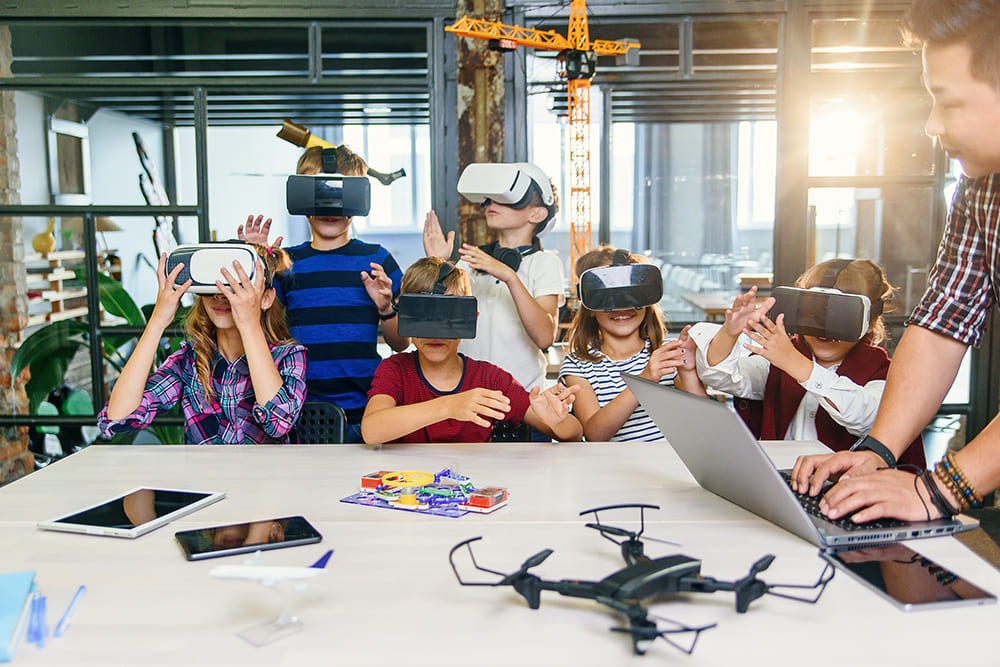Is Virtual Reality the Future of Entertainment?
2 August 2021
Almost half of all worldwide investments in virtual reality fall under entertainment. The VR global gaming market alone was valued at $11.5 billion in 2019, and is predicted to grow at an annual rate of 30 percent from 2020 to 2027.
Beyond gaming, virtual reality technology is revolutionizing the entire world of entertainment, including creating more immersive, engaging experiences across sports, performing arts, visitor attractions, and social media.

We are moving closer and closer to a future in which the virtual and real worlds become inseparable, and entertainment plays a key role in that transformation.
So is virtual reality the future of entertainment? There are tons of real-world use cases I could cover in this post, but for now, let’s focus on a few of my favorites. I’ll also make some predictions about the future of VR entertainment.
VR Visitor Experiences
Museums and galleries around the world now offer virtual tours to increase engagement with visitors. These tours, designed to bring art and culture to life, vary in complexity from simple 360-degree walkthroughs to highly immersive experiences.
The National Gallery in London and the Vatican Museum in Rome both have VR tours that let visitors get close to exhibits and learn the history and stories behind them without dealing with travel or crowds.
The Virtual Online Museum of Art (VOMA), which launched in 2020, is the world’s first completely virtual museum. VOMA presents curated exhibitions with art loaned from around the world.
Virtual zoo experiences like Zoo World from Intentio Education Game Studios get users up close and personal with animals as they go on a series of environmental-themed quests around the world.
VR technology can also be integrated into physical visitor attractions like traditional theme parks. Roller coasters, drop towers, and water slides become even more stomach-dropping when users are wearing headsets that enhance the ride experience with elements of VR.
Immersive Sports Experiences
The use of VR in sports will also skyrocket in the future. VR is already being used to improve the viewing experience for fans and create realistic training simulations for athletes, and now innovative developers are working on VR-based esports.
Today, fans can use VR to watch their favorite football game from different positions in the stadium (or even from the middle of the field) and follow their favorite racing cars on the track at Formula E.
HADO, the world’s first physical esport, is essentially dodgeball with added virtual elements. Players can meet up on real-life courts in 60 HADO arenas in 15 countries. Equipped with virtual energy balls and shields, players try to hit the other team with a barrage of energy balls while sustaining as little damage as possible.
The Future of Entertainment
It’s unlikely that virtual reality will entirely replace traditional forms of entertainment in the near future, but XR technology will continue to make entertainment more immersive and engaging. That means we’ll get to experience more VR entertainment, particularly as equipment becomes lighter, better, and more affordable.
Very soon, I predict that anything you currently do for fun – including cheering on your favorite sports team, visiting the Mona Lisa, or playing a game of frisbee with your friends – could be possible in the virtual world as entertainment and VR become more integrated.
Related Articles
2025’s Tech Forecast: The Consumer Innovations That Will Matter Most
Consumer technology covers all of the tech we buy to make our lives more convenient, productive or fun.[...]
7 Healthcare Trends That Will Transform Medicine In 2025
Healthcare has evolved dramatically in recent years, with technology driving countless new opportunities, just as demographic and societal factors have created new challenges.[...]
The Simple ChatGPT Trick That Will Transform Your Business AI Interactions
I believe ChatGPT and other generative AI tools can help pretty much any business.[...]
The Third Wave Of AI Is Here: Why Agentic AI Will Transform The Way We Work
The chess pieces of artificial intelligence are being dramatically rearranged. While previous iterations of AI focused on making predictions or generating content, we're now witnessing the emergence of something far more sophisticated: AI agents that can independently perform complex tasks and make decisions.[...]
How Generative AI Will Change Jobs In Cybersecurity
Ensuring robust cybersecurity measures are in place is more important than ever when it comes to protecting organizations and even governments and nations from digital threats.[...]
The 10 Most Important Banking And Financial Technology Trends That Will Shape 2025
As technological disruption and economic uncertainty continue to reshape the financial landscape, alongside dramatic shifts in consumer behavior and regulatory requirements, 2025 promises to be both challenging and opportunistic for banking and financial services.[...]
Sign up to Stay in Touch!
Bernard Marr is a world-renowned futurist, influencer and thought leader in the fields of business and technology, with a passion for using technology for the good of humanity.
He is a best-selling author of over 20 books, writes a regular column for Forbes and advises and coaches many of the world’s best-known organisations.
He has a combined following of 4 million people across his social media channels and newsletters and was ranked by LinkedIn as one of the top 5 business influencers in the world.
Bernard’s latest book is ‘Generative AI in Practice’.










Social Media